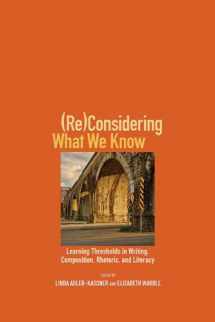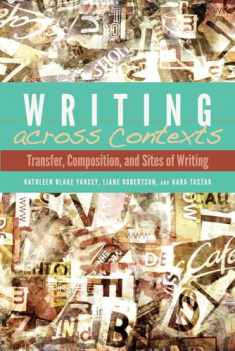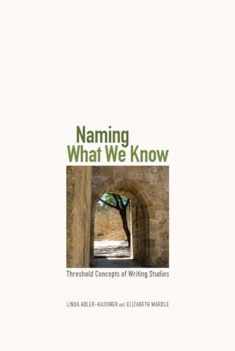
(Re)Considering What We Know: Learning Thresholds in Writing, Composition, Rhetoric, and Literacy
ISBN-13:
9781607329312
ISBN-10:
160732931X
Edition:
1
Author:
Elizabeth Wardle, Linda Adler-Kassner
Publication date:
2020
Publisher:
Utah State University Press
Format:
Paperback
354 pages
Category:
Writing
,
Writing, Research & Publishing Guides
FREE US shipping
on ALL non-marketplace orders
Rent
35 days
Due Jun 10, 2024
35 days
from $30.11
USD
Marketplace
from $34.08
USD
Marketplace offers
Seller
Condition
Note
Seller
Condition
Used - Good
Book details
ISBN-13:
9781607329312
ISBN-10:
160732931X
Edition:
1
Author:
Elizabeth Wardle, Linda Adler-Kassner
Publication date:
2020
Publisher:
Utah State University Press
Format:
Paperback
354 pages
Category:
Writing
,
Writing, Research & Publishing Guides
Summary
(Re)Considering What We Know: Learning Thresholds in Writing, Composition, Rhetoric, and Literacy (ISBN-13: 9781607329312 and ISBN-10: 160732931X), written by authors
Elizabeth Wardle, Linda Adler-Kassner, was published by Utah State University Press in 2020.
With an overall rating of 4.3 stars, it's a notable title among other
Writing
(Writing, Research & Publishing Guides) books. You can easily purchase or rent (Re)Considering What We Know: Learning Thresholds in Writing, Composition, Rhetoric, and Literacy (Paperback) from BooksRun,
along with many other new and used
Writing
books
and textbooks.
And, if you're looking to sell your copy, our current buyback offer is $10.8.
Description
Naming What We Know: Threshold Concepts of Writing Studies, published in 2015, contributed to a discussion about the relevance of identifying key concepts and ideas of writing studies. (Re)Considering What We Know continues that conversation while simultaneously raising questions about the ideas around threshold concepts. Contributions introduce new concepts, investigate threshold concepts as a framework, and explore their use within and beyond writing.
Part 1 raises questions about the ideologies of consensus that are associated with naming threshold concepts of a discipline. Contributions challenge the idea of consensus and seek to expand both the threshold concepts framework and the concepts themselves. Part 2 focuses on threshold concepts in action and practice, demonstrating the innovative ways threshold concepts and a threshold concepts framework have been used in writing courses and programs. Part 3 shows how a threshold concepts framework can help us engage in conversations beyond writing studies.
(Re)Considering What We Know raises new questions and offers new ideas that can help to advance the discussion and use of threshold concepts in the field of writing studies. It will be of great interest to scholars and graduate students in writing studies, especially those who have previously engaged with Naming What We Know.
Contributors:
Marianne Ahokas, Jonathan Alexander, Chris M. Anson, Ian G. Anson, Sarah Ben-Zvi, Jami Blaauw-Hara, Mark Blaauw-Hara, Maggie Black, Dominic Borowiak, Chris Castillo, Chen Chen, Sandra Descourtis, Norbert Elliot, Heidi Estrem, Alison Farrell, Matthew Fogarty, Joanne Baird Giordano, James Hammond, Holly Hassel, Lauren Heap, Jennifer Heinert, Doug Hesse, Jonathan Isaac, Katie Kalish, Páraic Kerrigan, Ann Meejung Kim, Kassia Krzus-Shaw, Saul Lopez, Jennifer Helane Maher, Aishah Mahmood, Aimee Mapes, Kerry Marsden, Susan Miller-Cochran, Deborah Mutnick, Rebecca Nowacek, Sarah O’Brien, Ọlá Ọládipọ̀, Peggy O’Neill, Cassandra Phillips, Mya Poe, Patricia Ratanapraphart, Jacqueline Rhodes, Samitha Senanayake, Susan E. Shadle, Dawn Shepherd, Katherine Stein, Patrick Sullivan, Brenna Swift, Carrie Strand Tebeau, Matt Thul, Nikhil Tiwari, Lisa Tremain, Lisa Velarde, Kate Vieira, Gordon Blaine West, Anne-Marie Womack, Kathleen Blake Yancey, Xiaopei Yang, Madylan Yarc
Part 1 raises questions about the ideologies of consensus that are associated with naming threshold concepts of a discipline. Contributions challenge the idea of consensus and seek to expand both the threshold concepts framework and the concepts themselves. Part 2 focuses on threshold concepts in action and practice, demonstrating the innovative ways threshold concepts and a threshold concepts framework have been used in writing courses and programs. Part 3 shows how a threshold concepts framework can help us engage in conversations beyond writing studies.
(Re)Considering What We Know raises new questions and offers new ideas that can help to advance the discussion and use of threshold concepts in the field of writing studies. It will be of great interest to scholars and graduate students in writing studies, especially those who have previously engaged with Naming What We Know.
Contributors:
Marianne Ahokas, Jonathan Alexander, Chris M. Anson, Ian G. Anson, Sarah Ben-Zvi, Jami Blaauw-Hara, Mark Blaauw-Hara, Maggie Black, Dominic Borowiak, Chris Castillo, Chen Chen, Sandra Descourtis, Norbert Elliot, Heidi Estrem, Alison Farrell, Matthew Fogarty, Joanne Baird Giordano, James Hammond, Holly Hassel, Lauren Heap, Jennifer Heinert, Doug Hesse, Jonathan Isaac, Katie Kalish, Páraic Kerrigan, Ann Meejung Kim, Kassia Krzus-Shaw, Saul Lopez, Jennifer Helane Maher, Aishah Mahmood, Aimee Mapes, Kerry Marsden, Susan Miller-Cochran, Deborah Mutnick, Rebecca Nowacek, Sarah O’Brien, Ọlá Ọládipọ̀, Peggy O’Neill, Cassandra Phillips, Mya Poe, Patricia Ratanapraphart, Jacqueline Rhodes, Samitha Senanayake, Susan E. Shadle, Dawn Shepherd, Katherine Stein, Patrick Sullivan, Brenna Swift, Carrie Strand Tebeau, Matt Thul, Nikhil Tiwari, Lisa Tremain, Lisa Velarde, Kate Vieira, Gordon Blaine West, Anne-Marie Womack, Kathleen Blake Yancey, Xiaopei Yang, Madylan Yarc


We would LOVE it if you could help us and other readers by reviewing the book
Book review

Congratulations! We have received your book review.
{user}
{createdAt}
by {truncated_author}




